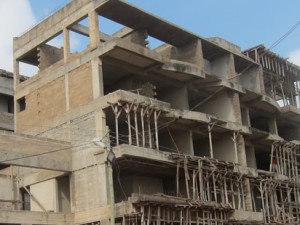Construction safety seminar held in Accra
 Mr Kennedy Darkey, President, KYC Nations, a real estate support company, has urged government to see the building of schools, hospitals and social amenities as a responsibility of solving national problems.
Mr Kennedy Darkey, President, KYC Nations, a real estate support company, has urged government to see the building of schools, hospitals and social amenities as a responsibility of solving national problems.
He said the provision of these amenities would solve national problems, create employment, boost the Gross Domestic Product, as well as promote and protect the lives of citizenry.
Mr Darkey gave the advice when he addressed students, people from the engineering fraternity and other stakeholders at the first ever KYC Nations national building and construction safety seminar held in Accra.
Speaking on the theme: “Protecting Lives, Properties and Investment; Our Shared Responsibility,” Mr Darkey called on the media to collaborate with the public to help hold leaders accountable for a directed focus consensus to be achieved towards nation building.
He said the seminar which was organised with a national focus aimed at addressing building, construction, individual’s lives and real estate developers’ safety issues in the country.
“Going by the theme one can confidently understand that protection of lives is a shared responsibility, which calls for accurate ideologies and strategic policies to enhance safety in construction,” he said.
He called for renewed commitment in the enforcement of existing laws that would help promote safety in the country’s construction sphere.
Mr Samuel Boamah, Transportation Engineer, Ghana Institution of Engineers, lauded KYC Nations for the initiative that sought to focus and bring to bear appropriate measures that would help protect buildings and people’s lives in the country.
He called for the appropriate use of materials in building to ensure safety.
Mr Boamah explained that, since each component in building materials plays a key role in building, there is the need for contractors as well as estate developers to know the techniques, to ensure the safety of individual’s lives.
Madam Sharon Bar-li, Ambassador of Israel, called for the adoption of green construction, which could be adjusted to the local environment conditions.
She suggested the need for constant improvement in the ways of building for Ghana to become a model of construction.
Madam Bar-li attributed the recent phenomenon of buildings collapsing to the employment of unskilled workers and called for adequate training of professional engineers and contractors who would help safe the country from the recent mayhem.
Mr Emmanuel Blankson, Manager of Corporate Operations, Activa Insurance, advised building owners, companies and government to have building insurance as it is a responsibility of everyone.
Source: GNA
PwC holds budget seminar
PwC Ghana has observed that consistent policy interventions across agriculture, services and industry would be key to government’s transformational agenda.
“In Ghana, for the current Budget to be transformational, it would need to accelerate growth in the agricultural sector by increased mechanisation,” says Felix Addo, Country Senior Partner PwC Ghana.
Speaking at a budget forum, Mr Addo said sustained investments in agriculture, manufacturing and infrastructure are central to economic transformation.
Across the high export commodities for Ghana, agriculture represents the only sector where a sustained increase in local processing is likely to add significant value to the economy, he said in a commentary on the 2015 budget statement.
According to PwC, radical structural policy interventions that increase mechanisation in agriculture are necessary to boost economic growth since they would pave the way to local manufacturing, processing of natural resources and reduce export deficit and budget deficit while also providing local employment.
However, government’s intentions to boost poultry farming, rice production, fisheries and aquaculture as captured in the budget, might not be enough to significantly diversify the economy and government would need to be more radical.
“PwC believe that although the budget statement lays out the framework for a transformational agenda with well-intended and timely policy interventions, the policies could have been a bit more aggressive,” Mr Addo said.
There is also the need for emphasis to be placed on the macro-economic environment; inflation, infrastructure, investment in physical and human capital, currency strength and vulnerability to external shocks.
The 2014 Budget sought to re-align objectives to meet key national priorities in order to enhance the resilience of the economy against risks, and promote accelerated growth and development with job creation.
However, it would prove to be a tough year, as the economy is plagued by severe macroeconomic imbalances such as consistently high inflation rates, current account and fiscal deficits, and massive foreign exchange swings which led to a highly depreciated domestic currency.
Source: GNA
